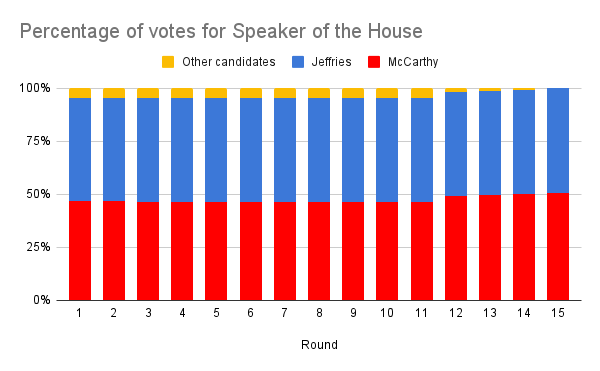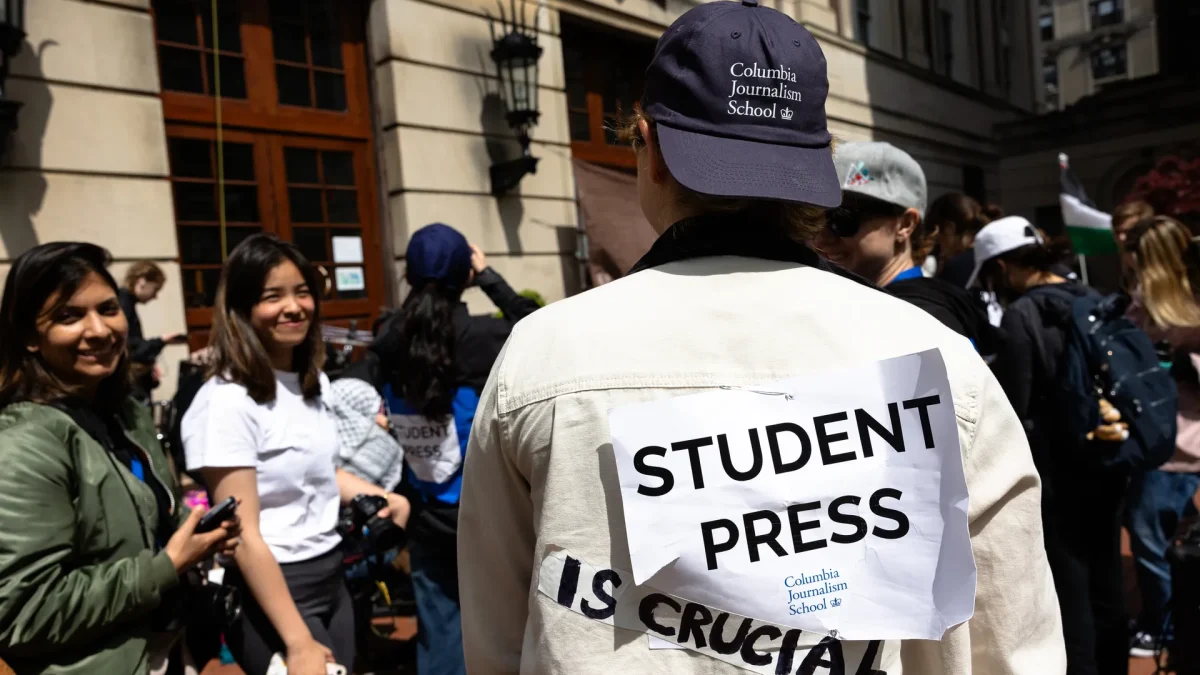The lengthy Speaker of the House election is an example of perseverance

Graph showing the percentage of votes received in each round by Kevin McCarthy, Hakeem Jeffries, and other candidates. As House members who voted for other candidates were persuaded to change their votes to “present,” McCarthy received a greater percentage of the total votes.
January 18, 2023
California representative Kevin McCarthy was elected Speaker of the House of Representatives on January 7, after 15 rounds of voting. McCarthy, a Republican, defeated Democratic nominee Hakeem Jeffries in the longest election process since before the Civil War. Now that the process is over, it’s easy to dismiss it as just another example of government dysfunction. But the question still remains: why did this election take so long?
A clear reason is splintering within the Republican Party. The Republican nominee was Representative Kevin McCarthy of California. However, a small faction of House Republicans opposed McCarthy, believing that he was not conservative enough. South government teacher Jeffrey Buszta explained that there were “a number of Republicans, 20 of them, who were voting for other people because they did not want [McCarthy] to be the Speaker.”
The current House of Representatives contains 212 Democrats and 222 Republicans, giving Republicans only a narrow majority. Because the margin between parties is so narrow, a small minority of Republicans prevented McCarthy from being elected.
Republicans who did not vote for McCarthy split their votes between a number of other candidates. “Any [representative] can vote for whoever they want, whether they’re nominated or not,” explained Buszta. Most rounds saw the nomination of one or more Republicans in addition to McCarthy, and people who had not been nominated also received votes. One of the more notable candidates was former President Donald Trump, who was voted for by representative Matt Gaetz of Florida.
In order to be elected Speaker of the House, a candidate needs at least 50% of all representatives voting for a specific person. If all representatives vote for a specific candidate, a candidate needs 218 votes to win. However, instead of voting for a specific candidate, representatives are also allowed to vote “present.” Voting “present” lowers the number of representatives voting for a specific candidate, thereby lowering the total number of votes that a candidate needs to win. One main strategy used by McCarthy and his supporters was to convince Republican holdouts to vote “present” rather than voting for a different Republican candidate, so that McCarthy could win with fewer votes. In the 15th and final ballot, six representatives voted “present,” allowing McCarthy to win the speakership with 216 votes – two fewer than he needed to win in the first ballot.
McCarthy made a number of concessions to more conservative Republicans in order to secure the votes needed to win. These included seats on important House committees and rules that lessen the power of the Speaker. Buszta outlined the differing perspectives on these concessions, saying that “to some people… McCarthy destroyed [the Republican Party] by giving away everything to them, and now it’s going to make future Speaker candidates weaker. That’s possible. On the other hand, it shows that we survived it.” A decision was eventually reached through the established process, and House members can now move on and focus on serving their constituents.
While the process may have been arduous, the government system did eventually win out. People who already feel discouraged by their representation or by handling of federal issues may be tempted to view the recent Speaker election as an example of the government’s inability to deal with tough situations. However, it can also be seen as an example of how the influence of an extreme few can be moderated through negotiation and perseverance.







![A power outage on Friday May 12 before the start of the school day led many students to leave the building and miss parts of first, second and third hour. “[Staff at the front door] said the power might be on at 11, so [we should] come back to school at 11,” recalled freshman Riley Olson. “A lot of people went back home.” However, Principal Afolabi Runsewe claimed and maintains that students were told to stay in the commons and were never given the option to leave school.](https://www.shsoutherner.net/wp-content/uploads/2023/06/power-outage-475x356.png)






